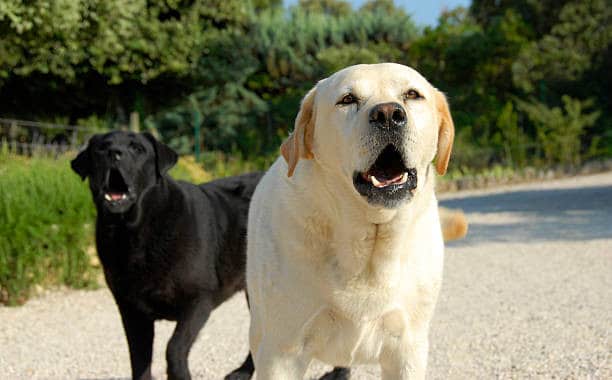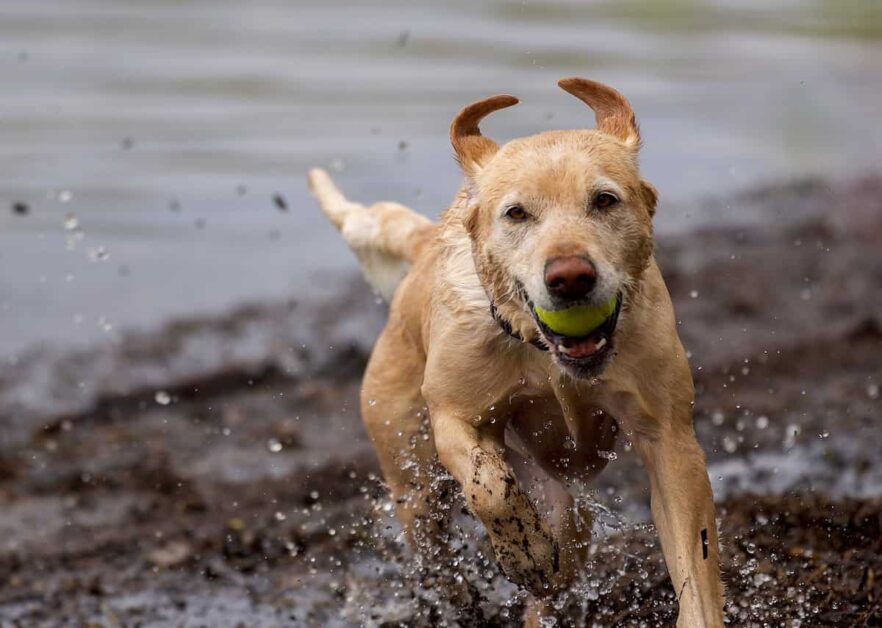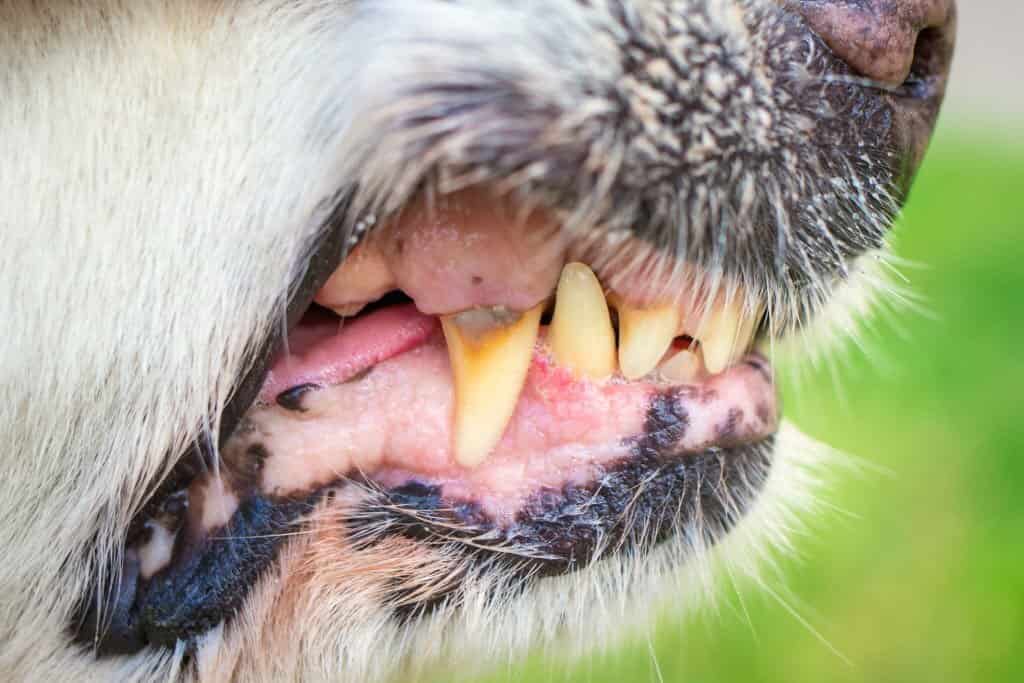All dogs bark, including your labrador retriever. The only exception is the basenji, who doesn’t bark but are vocal. However, before bringing your lab into your own, a common question can vex you: do labradors bark a lot?
Regarding vocalization, Labrador Retrievers exhibit a moderate tendency to bark compared to other breeds. Unlike certain breeds known for their excessive barking habits, Labs tend to be more reserved in their vocal expressions.
However, they don’t fall into the category of breeds that solely bark to alert you of danger. Instead, you can expect your lovable Lab to engage in periodic barking throughout the day, driven by a range of reasons and motivations.
Does A Labrador Retriever Bark a Lot Out of Aggression?
Several dog owners are concerned about their dogs being aggressive barkers. Labradors are not known for aggressive barking, though. However, they can act out of place when experiencing fear. If you find your lab barking excessively, there must be a cause. Excessive barking is because of fear and aggression. You must learn how to handle it effectively. Knowing the trigger point is key to canine communication.
5 Reasons Why Do Labrador Retrievers Bark A Lot?
Despite being hardworking, labradors are gentle and social dogs. Remember, excessive barking is the last thing they would want to do. Is it that your lab is trying to say something?
Your Labrador Needs Your Attention
Most labrador barking comes when labs seek their owner’s attention. Boredom or a wish to play might trigger them. While humans deviate from routine, labradors don’t. A slight change in the routine can lead to changed behavior.
For example, your lab may want attention if you generally go for walks at 7 pm, and now it’s 8. So now the labrador barks for attention. They won’t bark continuously but a few times to garner attention.
Your Labrador Retriever Wants to Go Outside for Potty
The most common reason is they want to excrete outside. Barking is their way of communicating they want to move out. Labs learn fast and are intelligent. They would not want to displease their owner by causing accidents.
If your lab is in the crate, they keep barking until you take them out for potty. Some labs also bark at the gate outside for their owner to notice to take them out. This is not a barking problem.
Your Labrador Retriever Senses Something Concerning or Dangerous
Animals are the first to notice environmental changes, and labs are no exception. These popular dog breeds bark not because they’re aggressive but because they are concerned about their owner. Your lab can bark too much when discovering something different in nature or the setting.
Delivery of a package, doorbell, another person or dog walking in, etc., can illicit barking. Generally speaking, a labrador retriever might bark before someone rings the bell. Sounds of TV, birds, and fireworks can trigger them. Barking is their way of informing you about the change.
Your Labrador Retriever Wants to Play With Some Other Dog
Barking is for communication with their kind as well. You might wonder why do labs bark a lot when seeing other dogs. But all they are trying to do is say they want to play.
The sound can get intense with more than one dog at home. Dogs of the same family might bark at one another to communicate better. The tail wagging is a perfect sign! However, barking outside after seeing another dog can be friendly or aggressive. A well-socialized lab is less likely to demonstrate aggression.
Territorial Instinct
Labradors were once hunting dogs. Despite being loyal and adorable, their aggression is dormant in some. They can start barking when they feel a threat toward themselves or their family. Dormant aggression can last long if fuelled.
Trainers use this characteristic to turn labs into security dogs. Territorial instinct rises in such situations. However, it can become an issue if you have a home dog.
How to Solve Labrador Retriever Barking Issues?
Sometimes labs can be annoying, despite being low barkers. If you notice it is becoming a habit, try to stop it. If you have understood why a lab barks, it’s time for solutions. Here are a few tips to help lessen labrador barking.
Detect the Reason for the Barks
The initial step is to determine the trigger event. Is the barking meant to safeguard? Is it always an indication to go out? Is it because of the doorbell or some dog barking nearby?
If you live in a small apartment, your lab might easily get distracted by various sounds. Look for strategies that will tackle barking in small spaces. Finding the trigger point makes it easy to find an adequate solution.
Provide Exercise and Entertainment
Labs are full of energy. You must try to keep them engaged and animated. Taking them on a walk regularly is vital. Keep puzzle toys, and chew toys handy to keep your lab entertained. A balance of entertainment and exercise will keep them in good shape.
Train Your Lab to Ring a Bell at the Outside Door
An intelligent way to stop the barking is to teach your dog to ring a bell and communicate. You can put a bell at the outside door, ring it, give a treat to your lab, and draw them out. Repeat this for the upcoming days.
- Next, take the gummies to your lab’s nose and make them ring the hanging bell.
- Treat them after that and take them to potty outside.
- Then, hold the gummies near the bell and hold them back for your dog to touch the bell.
- Once done, treat them and take them outside for potty.
The treating and ringing for some days will result in changed behavior. Your labrador retriever will bark less and understand there is another rewarding approach.
Use Training Methods Like “Watch Me” for Outside Barking or Dog-to-Dog Barking
The “Watch Me” training technique can help if barking is an issue during the walks. The method brings your dog’s attention to your face rather than other distractions. The “Watch Me” phrase will remove their eyes from other things.
- You can instill the command by holding a treat and bringing the lab’s attention.
- Start saying the command in a less distracting environment.
- Inside your home can be an excellent place to start. Redo 5-10 training sessions and then continue daily.
- Also, teach the same in an outside environment like your yard. Start following it during the walks.
- When you can grab your dog’s attention from other distractions, you can stop the barking before it worsens.

Remove Triggers
Shifting focus from “how you can fix it” works wonders. Removing the trigger point is an awesome way of reducing the barking.
If you do not have time for a specific activity or play, distract them. Instead of playing, please give them a chew toy or treat to remain occupied.
There are several ways to remove triggers and keep your lab controlled. Understand their triggers and find appropriate ways to eliminate them.
Visit the Vet
If you have tried everything and nothing works, it’s time to seek professional help. Illnesses or underlying health conditions can cause your lab to bark excessively. Destruction or uneasiness can accompany the barking. If you notice these symptoms, it is best to contact a vet. They will examine your lab and formulate a treatment plan.

When Do Lab Puppies Start Barking?
Lab puppies can begin barking when they are 5-6 weeks. The tiny barks are audible during the period as they are in a playful mood. However, whining is more prominent than barking in labrador retriever puppies.
The barks coming from the labrador puppies are not loud or frequent. As they grow, the barking becomes pronounced. The efforts made to train the dog to lessen barking become a game-changer. Address the underlying issues and find symbiotic solutions.
Why Is My Labrador Barking While Asleep?
Some labrador retrievers bark while sleeping. While it is hilarious, it can also be alarming. A study on dogs’ sleep behavior suggests they sleep in stages. REM, or rapid eye movement stage, can cause tail wagging, facial expressions change, and barking.
One mostly hears muffled barking from sleeping labs because of their closed mouths. Whining and growling are other sounds apart from barking. The sleep barking can wake you up if you are in the same room. However, the barking is short-lived and will vanish in no time.
Why Do Dog Breeds Bark At Night?
Dogs have sensitive hearing and can listen to the faintest of sounds. Too much background noise in the day masks individual sounds. However, sounds are more prominent at night.
All wildlife wakes up at night, including rodents, bats, cats, badgers, etc. This is why a lab barks at night.
These sounds act as triggers. They can react to them during the night by barking. Other reasons are separation anxiety, environmental change, unspent energy, etc.

Separation Anxiety
Separation anxiety causes your labrador to bark and cry when isolated. They will bark all night if separated. If it is separation anxiety, you can also notice it during the day. Your labrador is most susceptible to this when three to six months. They are most comfortable with you around them. So if you stay away too much, the fear and restlessness will reflect in the form of barking.
When Do Labradors Bark A Lot?
Humans communicate by speaking. Similarly, barking is a communication form in dogs. Your labrador is trying to say something. If they are missing you and want some attention, they bark. Food, water, and potty can cause them to make noise. They bark if feeling anxious, scared, or sense something unusual.
More excitement or wanting to play also results in the same. Dogs get super excited about visiting a new person or pet. Labradors are high-energy dogs ready to jump and play all the time. You only need to get worried when the barks are unusual and excessive.

FAQs on does labrador bark a lot
Is Labrador a quiet dog?
Labradors are not a quiet breed. They are known to bark, but the frequency and volume can vary greatly from dog to dog.
Which dog breeds bark the least?
Breeds known for barking less include the Basenji, Shiba Inu, and the Newfoundland.
Do Labradors bark at night?
Labradors, like any breed, can bark at night. This could be due to anxiety, boredom, or a response to noises.
Are Labs vocal dogs?
Yes, Labradors can be quite vocal. They may bark, whine, or make other noises to express their needs or emotions.
Do Labs ever calm down?
Yes, Labradors do calm down as they age. They become calmer as they reach their senior years.
How do I get my Lab to stop barking for attention?
Training is key to managing barking behavior. Ignoring the barking and rewarding quiet behavior can help. Always make sure your Lab gets enough physical exercise and mental stimulation
Why does my yellow lab bark so much?
The color of a Labrador doesn’t influence its tendency to bark. If your yellow Lab is barking a lot, it could be a response to certain stimuli in their environment.
Do Labs grow out of barking?
While Labradors may become less energetic and possibly less vocal as they age, barking is a natural behavior for dogs and not something they ‘grow out of.
are labradors loud?
The volume of a dog’s bark is largely determined by its size and breed. Labradors are a larger breed, so their bark can be quite loud. Their level of excitement or distress can also influence the loudness of their bark.
Author Profile

- In House Labrador Trainer
- Samta is an experienced Labrador trainer and enthusiast with over 5 years of hands-on experience, contributing invaluable insights and advice to Labradorandyou.com. Her deep understanding of Labrador temperament and intelligence underpins her effective training techniques and product recommendations. Through firsthand experience of the joys and challenges of raising Labradors, Samta's articles provide expert advice for both seasoned and new Labrador owners, covering training, care, and innovative product selection. Her commitment to enhancing the well-being of Labradors and their owners permeates her work, making it an indispensable resource for Labrador enthusiasts
Also by the author
-
 FAQNovember 16, 2023Why Is My Dog Pooping So Much? MUST KNOW Facts
FAQNovember 16, 2023Why Is My Dog Pooping So Much? MUST KNOW Facts
-
 FAQNovember 16, 2023Why Is My Dog So Skinny? 9 Reasons With Solutions
FAQNovember 16, 2023Why Is My Dog So Skinny? 9 Reasons With Solutions
-
 Mix-BreedsNovember 16, 2023Straight Haired Labradoodles Complete Guide: All You Need To Know
Mix-BreedsNovember 16, 2023Straight Haired Labradoodles Complete Guide: All You Need To Know
-
 Lab-TypesNovember 6, 2023Block Head Labs: Are They Better And Healthier?
Lab-TypesNovember 6, 2023Block Head Labs: Are They Better And Healthier?





